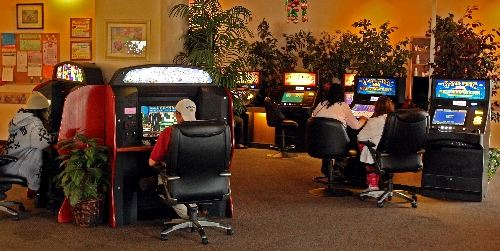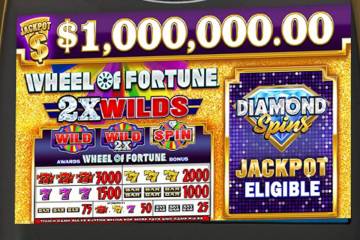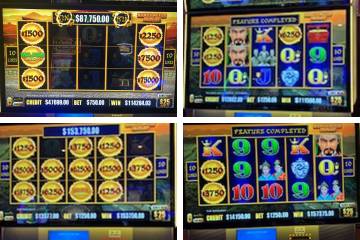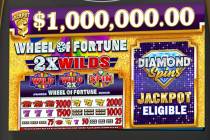Dotty’s: A tavern or slot parlor?
From the outside, Dotty's Gaming & Spirits looks like any of the hundreds of taverns operating throughout the Las Vegas Valley.
The inside is what concerns some of the larger casino companies, a Clark County commissioner, and rival tavern operators.
An argument is being made that Dotty's, which has 68 locations in Nevada, including 40 throughout Clark County, is nothing more than a glorified slot machine parlor, offering snack food and minimal alcohol while focusing solely on gaming.
The lack of a full kitchen allows Dotty's to avoid the voter-enacted smoking prohibition, which bans tobacco use where food is served.
Jim Spinello, director of local government affairs for R&R Partners, said the Dotty's business model is contrary to the Clark County ordinance governing taverns in which the gaming operation is deemed "incidental to the primary business."
"These businesses are nothing more than slot arcades. Their primary business is gaming," said Spinello, who was representing the Nevada Resort Association at public workshop for the Clark County Commission's Liquor and Gaming Board Wednesday afternoon.
The meeting, attended by tavern owners, slot machine route operators, and gaming industry representatives, had to be moved from a conference room at the Clark County Government Center to the commission hearing room because of the size of the group.
Clark County Commissioners Steve Sisolak and Chris Giunchigliani were seeking input into a proposed moratorium on issuing new liquor licenses in Clark County. The move is seen as a way to curb the growth of Dotty's and similar businesses that are now beginning to emerge in the valley.
The resort association, a statewide lobbying group for the major casino companies, believes Dotty's is skirting gaming tax collections. Casinos and other nonrestricted gaming license holders pay a tax on gross gaming revenues as well as a fee per slot machine.
The Dotty's locations, the bulk of which have restricted gaming licenses and just 15 slot machines each, pay a flat fee per machine and are not taxed on gaming revenues.
Patricia Becker, a gaming consultant to Dotty's, said the business has been operating since 1995, long before the smoking ban was enacted. This year, the company added four locations in Clark County and has two more planned for 2011.
"That is not exactly proliferation," said Becker, who served as a member of Nevada's Gaming Control Board from 1983 to 1986. Becker said gaming regulators conducted a study of Dotty's business model in 2005 and deemed gaming as incidental to the business.
That didn't sit well with Sisolak, who said the Dotty's are not like other taverns. They lack the full services other taverns offer and operate with just one employee per shift. He said the county's business license department audited several of the Dotty's and found gaming revenues accounted for 90 percent or more of the location's cash flow.
"That's not exactly incidental," Sisolak said.
Sisolak said he was approached by the Nevada Resort Association to slow the expansion of Dotty's.
Becker and Dotty's attorney Chris Kaempfer said the locations market to an audience that doesn't want to frequent the typical tavern operation. The company, they said, often takes over tavern locations that have gone out of business.
Dotty's Chief Financial Officer Michael Eide said the company spends between $700,000 and $1 million per location for new gaming equipment and other remodeling costs. Dotty's also has state gaming licenses as a slot machine route operator and gaming equipment manufacturer.
The company employs more than 500 people in Nevada.
Rival tavern operators, who may have lost business to Dotty's, seem to have embraced the business model.
Randy Miller, who operates the Foothill taverns and two small casinos, recently opened Molly's, a tavern based somewhat on the Dotty's model.
He told Sisolak and Giunchigliani that business operations, not government intervention, should determine if a business model works.
Contact reporter Howard Stutz at hstutz@reviewjournal.com or 702-477-3871.






















